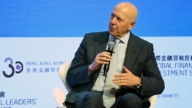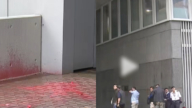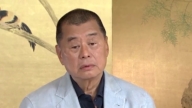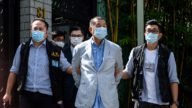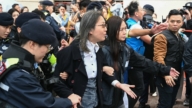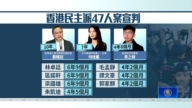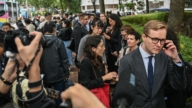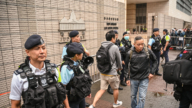【新唐人2014年12月09日讯】香港立法会8号开会审议《版权(修订)条例草案》,这个条例草案被称为“网络23条”,由于可能箝制网络言论和创作自由,三年前引发网民强烈反弹而触礁。这次的重新审议,也受到网络团体的关注。
立法会8号开会审议“网络23条”,受到网络团体和媒体的关注,香港《苹果日报》线上视频直播,网络组织“键盘战线”和“版权及二次创作关注联盟”,也为市民文字直播“网络23条”草案委员会会议及解释条文内容。
“网络23条”是网民对这个法案的戏称,正式的名字叫做《版权(修订)条例草案》。“23条”的称呼,则来自于《香港基本法》中被抨击为恶法的第23条。“23条”立法被认为会严重影响香港市民固有的自由、权利和资讯流通,03年“七一”时曾引发50万港人上街游行反对,港府最终终止了立法程序。
而“网络23条”三年前的修订草案,同样引发网民和文艺界的强烈反对。很多网民都对草案中的“版权条例刑事化”和“二次创作不受豁免”非常抗拒,担心修订通过后,香港可能像中国大陆,以法例审查网上言论及创作,箝制言论及创作自由。由于各方面的反弹,最终有关修订在2012年5月被搁置。
今次立法会8号审议的最新草案,是港府在今年6月提出的,如果获得通过最快明年生效。新草案把戏仿、讽刺、滑稽、模仿、评论时事及“引用”等作品纳入豁免范围。不过,网民团体不满非时事或非恶搞题材不能豁免,认为创作自由依然受到压制。
而港人目前对“网络23条”的态度,也在占中运动的一个插曲中体现出来,11月中旬,一些蒙面人士冲击了香港立法会,就是因为有人在网上号召前去阻止立法会当天审议“网络23条”。虽然事后证明,立法会当天并没有有关议程。
原《香港联合报》文艺专栏作家张成觉:“网民对这个‘网络23条’肯定也并不是赞同的。因为这个东西有束缚老百姓言论的意味在里面。原来这个‘23条’已经很大的抵触了,他们也援用了这样一个名称的话,那就表明了态度了,就是市民对这个并不认同。”
而香港网民对“网络23条”可能打破“一国两网”,让香港也像大陆一样,逐渐失去网络言论自由的担心,并非毫无道理。
根据非政府组织“自由之家”(Freedom House)4号在华盛顿发布的《2014年网络自由》报告,通过对全球65个国家的调研,中国排名倒数第三,再次被列为世界互联网自由度最差的国家之一。这一报告的作者还表示,香港的“占中行动”等,让中共更加担心网络自由会动摇其统治地位。
张成觉:“北京方面对于香港的控制,是绝对不会放松的。在目前这个情况下,趋势只会越来越严。所以中国的网络自由度这么严重的问题,严峻的态势,肯定对香港是不利的。”
另一方面,长期关注中国各地维权情况的“民生观察网站”负责人刘飞跃表示,中国的网络自由度的确大幅度下降。
“民生观察网站”负责人刘飞跃:“网络采取了很多整肃的措施。从去年年底开始的,打大V的行动,到今年一直在继续﹔还有一些记者,很多还是官方的,他们自己的记者都被抓捕了,有的被判刑了。另外像微博啊,很多人微博都没用了,不敢用了,不敢发言了。”
目前在中国大陆,不仅脸书、推特、Youtube等海外社交平台被屏蔽,香港学生9月罢课时,新浪微博在前一天就封锁了“罢课”和“香港”等关键词。还有不少大陆民众因为转发占中的帖子和照片被抓捕。
而在香港,学生和市民可以自由使用社交网络平台,随时分享占中的照片、标语、视频等。“自由之家”分析研究员马德琳•厄普(Madeline Earp)对媒体表示,这就是中国政府为什么如此恐惧网络自由、也是中国网民一直想办法要突破网络封锁的原因。
采访编辑/尚燕 后制/钟元
Article 23 Under Review Sparks Concerns Amongst Hong Kongers.
On Dec. 8, Hong Kong Legislative Council held a meeting
to review a bill for “Copyright (Amendment)
Ordinances Draft",
which was referred to as “Internet Article 23″.
This bill may well suppress freedom of expression
and creation on the internet.
Three years ago, it sparked a strong reaction from internet users,
hence it has been shelved.
This review has also created a concern amongst groups
on the Internet.
Hong Kong Legislative Council reviewed
the “Internet Article 23″ on Dec. 8,
sparking concerns to internet groups and media.
Hong Kong “Apple Daily" arranged an online video broadcast,
and Internet group “Keyboard Fronts" and " Union
of Concerning Copyright and Second Creation",
also relayed the online text draft version of the committee
meeting on “Internet Article 23, with the hope “
of interpreting the provisions of the draft.
“Internet Article 23″ is a nickname named by netizens
for this bill. It is formally called a Bill for
“The Copyright (Amendment) Ordinances Draft".
The title of “Article 23″ is from the Article 23 of the
“Hong Kong Basic Law"
which has been criticised as a harsh code.
“Article 23″ is considered to seriously affect
the inherent freedom, rights and flow of information
of Hong Kong people,
which caused half a million Hong Kong people to demonstrate
against it on the streets in July 1, 2003.
This action finally led to the Government having to terminate
its legislative process.
When the draft of “Internet Article 23″ was amended
three years ago, it also triggered strong opposition
from the Internet users and the literary and art circles.
Many Internet users are strongly resistant
to the specifics of the article draft,
including “criminalisation of the Copyright Ordinance"
and “second creation is not exempt".
The internet users worry, that to pass the amendment version,
will convert Hong Kong in to the likes of mainland China,
which will review the online speech and its creation,
suppressing the freedom of speech and the creative.
Due to the resistance of all aspects, the amendments were
shelved in May of 2012.
The latest draft reviewed by the Legislative Council on Dec. 8,
was proposed in June of 2014 by the Government.
If it passes through, it will take effect no sooner than next year.
The new draft expands the exemption scope including
trick imitation, ironic, funny, imitation,
commenting on current affairs and “citing" other works.
However, netizen groups are dissatisfied with the theme of
non-current events and non-spoofing topics cannot be exempted,
and believe that the creating of freedom is still suppressed.
The present attitudes of Hong Kong people to “Internet Article 23″
have also been reflected through some incidents
of Occupy Central Movement.
In the middle of November, some masked people
attacked the Hong Kong Legislative Council,
this is because some people called on the internet
to stop the Legislative Council reviewing
“Internet Article 23″.
However, after the incident, it was confirmed that the Council
had no relevant agenda for that day.
The former literary columnist Chengjue Zhang of
“United Daily News Hong Kong":
“Netizens should disagree to this “Internet Article 23″
because the article means to trample upon
the free speech of the people.
The original “Article 23″ of the “Hong Kong Basic Law"
has been considerably resisted.
So they use such a name to show their attitudes,
which means that Hong Kong people do not agree with this."
Hong Kong Internet users worry that Article 23″ might break
the ruling of “one country, two Internets",
which turns Hong Kong more in to the ways of Mainland China,
gradually losing freedom of speech,
from this we see such a worry is not
without reason.
According to the “2014 Internet Freedom Report" released
by NGO “Freedom House" in Washington on Dec. 4,
among 65 surveyed countries in the world,
China ranked third in the polls,
and again listed as one of the world’s
Worst Internet Freedom Countries.
The author of the report also said Hong Kong’s
Occupy Central Movement,
makes the CCP ever more concerned that the Internet freedom
will shake its ruling status.
Chengjue Zhang: “Beijing will not completely release
its control over Hong Kong.
Under the current circumstances,
such a trend will become increasingly serious.
So such grim problems concerning China’s Internet freedom
and unfavourable circumstances, are certainly
no good for Hong Kong."
On the other hand, “Livelihood Watch Website" has concerns
over the human rights defence situation in China.
The website team leader Mr Liu Feiyao says,
the freedom of China’s Internet indeed has
a significant decline in the degree of freedom.
Liu Feiyue: “Many measures on the Internet have been taken
for purging the Internet.
From the end of last year, the incident of attacking the big (VIP’s)
of the internet community, has been maintained.
A lot of journalists, many of whom are from official agencies,
including their own reporters, have been arrested and some
even sentenced to jail.
Also like microblogging, a lot of people did not
use microblogging, because they were afraid to use it,
and did not dare to speak up."
In Mainland China, not only Facebook, Twitter, Youtube
and other overseas social networking platforms are blocked,
but also the Sina Weibo was blocked of key sensitive words
such as “strike" and “Hong Kong" on the first day
of Hong Kong students strike in September.
In addition, many people in Mainland China were arrested
due to forwarding Internet articles and photos
of Occupy Central.
In Hong Kong, students and the public are free
to use social networking platforms.
They are free to share photos, posters
and videos of Occupy Central.
“Freedom House" analysis researcher Madeline Earp
told the media that this is the reason,
why the Chinese government is so afraid of internet freedom,
as well as why the Chinese netizens have to find ways
to break through the Internet blockade.
Interview & Edit/ShangYan Post-Production/ZhongYuan


